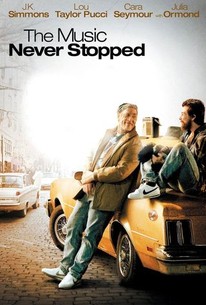 | Aural Fixation:The Music Never Stopped |
 |
“Aural Fixation” is a music-themed column I wrote for PopMatters.com from 2011-2013. They are no longer online there, but I have reformatted them here at the DMDB blog with additional videos, photos, and links, such as where to buy referenced albums. I have also used the title “Aural Fixation” for any essays I have written outside of PopMatters.com as well. To see the essays, check out the Dave’s Music Database Aural Fixation page.
The essays from PopMatters.com have been gathered in book form as Aural Fixation: Essays from a Music Obsessive. Essays written from 2009 to 2011 have been gathered in the book No One Needs 21 Versions of “Purple Haze”. You can purchase the essays in book format here. |
I just finished watching the movie The Music Never Stopped. Wow. It was even more powerful than I'd hoped. I don't know that I've ever felt like I really have been able to explain to anyone why music matters so much to me. I'm not sure myself. This movie touches on some of it, though. Music has a power to connect people, to bridge generation gaps. If people are open-minded to other people's tastes, they can discover whole new worlds. People speak often of how music touches their souls. How great a gift is it, then, to respect someone's music? To listen to it? To cherish it? To make an attempt to understand it - even if it may not be one's personal taste? It shows a respect for that person, for his soul, for his very essence. J.K. Simmons plays a dad (Henry) desperate to reconnect with his son Gabriel (Lou Taylor Pucci). It is 1986, but Gabriel is stuck in the late ‘60s. A month shy of his high school graduation, Gabriel left home for good. 20 years later, he is found wandering the streets, having long suffered the effects of a brain tumor. It is benign, but because it was left unchecked for so long, it has seemingly destroyed his ability to form new memories. When he is checked into the hospital, he answers basic questions like his name and when he was born, but can’t identify what year it is now or who is president. When a musical therapist plays the piece of music that opens the Beatles’ “All You Need Is Love,” Gabriel comes alive. He breaks into detailed conversation about how much he loves the song, the album, the group. Initially, Dad is angry and resentful that the music therapist is bringing Gabriel back to what, for Henry, was a time of pain. He wants to play his music for Gabriel, the songs he personally connected with and songs he thought bore a connection between himself and his son. The movie offers flashbacks where Henry quizzes his young son on songs like “Till There Was You” and “Young at Heart.” Henry certainly doesn’t want to listen to the Grateful Dead, Bob Dylan, Cream, and Buffalo Springfield. But he eventually does. In a touching scene, he even trades in his vintage records for “anything loud that was made after 1958”. He starts to listen to his son’s music – more importantly, he starts to listen to his son. When he plays the music for his son, he listens to the stories and memories his son recounts. He reconnects with the son he’d lost twenty years earlier. Henry becomes determined to take Gabriel to a Grateful Dead concert. Gabriel narrowly missed out on a chance to see them – on the same night he ended up leaving home for good. By now, the movie has reached the point that Henry isn’t just listening to the Dead and going to their concert for his son, but for himself. He has connected to the music. He has connected to his son. Resources and Related Links:
First posted 9/13/2011; updated 10/28/2023. |








No comments:
Post a Comment